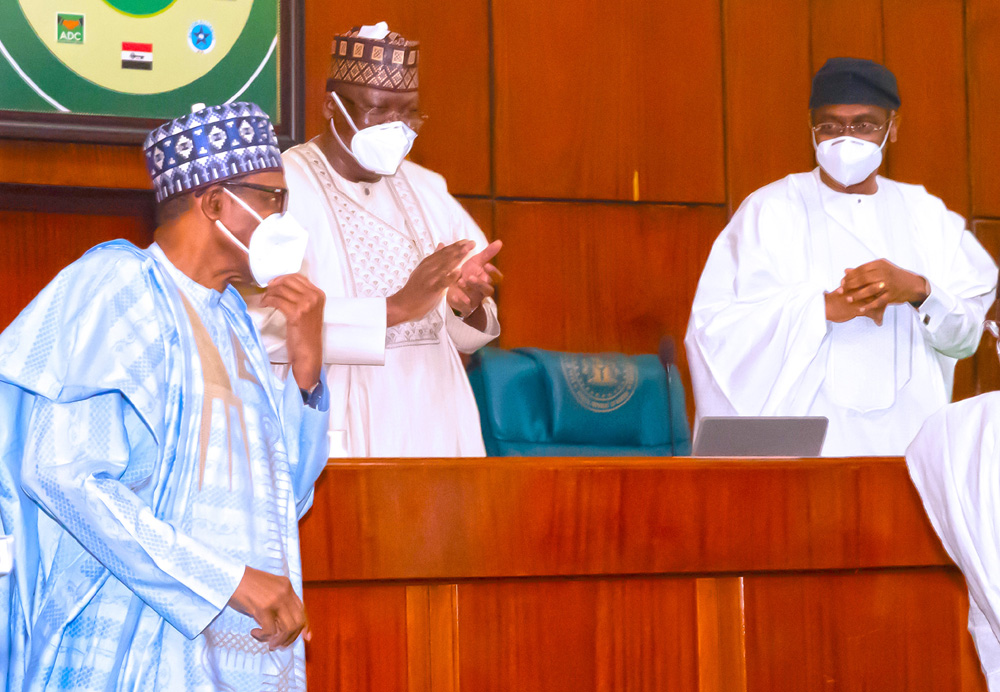Charles Abuede
- Nigeria President Buhari presents N13.08trn national budget for 2021
- Capital expenditure aggregated at N3.85trn
- While non-debt recurrent expenditure stands at N5.65 trn
Nigeria’s President Muhammadu Buhari, on Thursday, appeared before the joint session of the National Assembly for the presentation of the proposed 2021 national budget of N13.08 trillion. The proposed budget, which is titled, “Economic Recovery and Resilience”, is aimed at promoting economic diversity as well as enhancing social inclusion.
At the presentation before the lawmakers on Thursday in Abuja, the president highlighted that the proposed budget consists of N5.65 trillion as non-debt recurrent expenditure, N3.76 trillion for personnel cost and N3.124 trillion for debt service. Consequently, the sum of N501.19 billion was set aside as pensions, gratuities and retirees’ benefits; overheads in the sum of N625.50 billion and a sinking fund of N220 billion to retire certain maturing bonds.
Furthermore, the N13.08 trillion also includes N1.35 trillion in expenditure by 60 government-owned enterprises as well as Grants and Aid funded spending of N354.85 billion.
STATUTORY TRANSFERS
On the statutory transfers, President Muhammadu Buhari said the sum of N484.49 billion has been provided in 2021 budget. This amount is an increase of N56.46 billion or 13 per cent over the 2020 revised budget. The provisions include:
- N29.7 billion for the Nigerian National Petroleum Corporation;
- N63.5 billion for the Niger Delta Development Commission;
- N110 billion for the Nigerian Judicial Council;
- N128 billion for the National Assembly;
- N40 billion for the Independent National Electoral Commission;
- N5.2 billion for the Public Complaints Commission;
- N35.03 billion for Basic Health;
- N3 billion for the National Human Rights Commission;
- N20 billion for the Social Housing Programmes;
- N70.05 billion for Universal Basic Education Commission; and
- N420 billion for the Social Investment Programmes
RECURRENT EXPENDITURES
Planned recurrent expenditure, which is a major part of the budget, is allocated to paying salaries and overheads in MDAs which provide these critical public services. They include:
- The sum of N227.02 billion has been provided for the Ministry of Interior;
- N441.39 billion for the Ministry of Police affairs;
- N545.10 billion for the Ministry of Education
- N840.56 billion for Ministry of Defence; and
- N380.21 billion for the Ministry of Health
CAPITAL EXPENDITURE
The president disclosed that capital expenditure remains focused on the completion of as many ongoing projects as possible rather than commencing new ones. Major highlights of the 2021 Capital projects with key spending allocations in the 2021 budget include:
- N198 billion for Power; this includes the N150 billion for the Power Sector Recovery plan;
- N404 billion for Works and Housing
- N256 billion for Transportation
- N121 billion for Defence
- N110 billion for Agriculture and Rural Development
- N153 billion for Water Resources
- N51 billion for Industry, Trade and Investment
- N127 billion for Education
- N70 billion for Universal Basic Education Commission
- N132 billion for Health
- N100 for zonal intervention projects and
- N64 billion for the Niger Delta Development Commission
ASSUMPTIONS IN THE PROPOSED 2021 NATIONAL BUDGET
During the budget presentation exercise by the president, he revealed that the total expenditure is put at N13.08 trillion with an oil benchmark price of $40 to a barrel and an estimated daily oil production of 1.86 million barrels, which is inclusive of the daily condensate barrels of 300 thousand to 400 thousand. Also, the proposed budget is hinged on an assumed inflation rate of 11.95 per cent, foreign exchange target of N379 per dollar and output (GDP) growth of 3 per cent.
BUDGET FINANCING REVENUE SOURCES
Similarly, oil revenue is projected at N2.01 trillion and the non-oil revenue estimated at N1.49 trillion. Moreover, from the fiscal assumptions in place, the total federally shareable income is estimated at N8.433 trillion in the year 2021 while the aggregate revenue available to fund the national budget is placed at N7.89 trillion.
On financing the budget, the president announced that new borrowings which amount to N4.28 trillion will be used mainly for budget funding. Similarly, the sum of N709.69 billion in bilateral and multilateral loans secured for specific projects and programmes as well as the sum of N205.15 billion as proceeds from privatizations.









